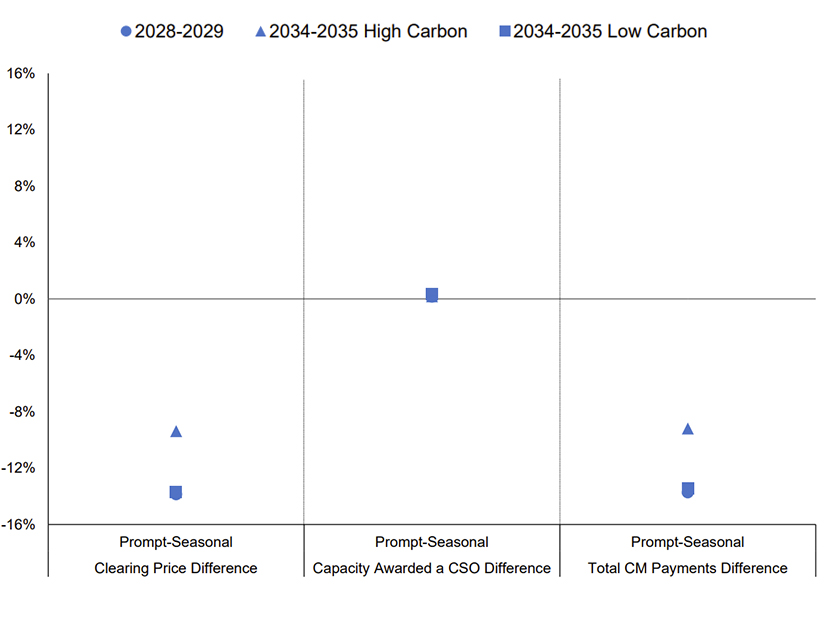ISO-NE told the NEPOOL Markets Committee on Feb. 7 that it is proposing a major redesign to its capacity market, moving from a three-years-ahead schedule to a prompt and seasonal design.
To accommodate the change, the RTO is also proposing an additional two-year delay of Forward Capacity Auction 19 for the 2028/29 capacity commitment period (CCP).
FCAs are currently held more than three years prior to each CCP. ISO-NE is proposing to break up the CCP into distinct seasons and hold the capacity auction just several months before its start.
ISO-NE has been contemplating the move with NEPOOL stakeholders for several months and commissioned Analysis Group to study the proposed changes. The consulting firm recommended that the RTO make the move, writing that it would “support the transition toward a grid of the future.” (See Analysis Group Recommends Prompt, Seasonal Capacity Market for ISO-NE.)
To provide time to complete the changes, ISO-NE is also proposing a “backstop” two-year delay of FCA 19 if the redesign is not approved by the time it is to be held in February 2026. FERC had approved a one-year delay of the auction to allow the RTO to implement its resource capacity accreditation (RCA) changes and contemplate the move to a prompt and seasonal market. (See FERC Approves ISO-NE’s One-Year Delay of FCA 19.)
ISO-NE expects the MC to vote on the delay of FCA 19 in March. The RTO did not comment on when it would put the redesign before stakeholders.
Chris Geissler of ISO-NE said the changes would better prepare the region for the changing resource mix and demand profile. A prompt market would better reflect “demand and resource capabilities used to determine capacity awards, thereby producing more cost-effective outcomes,” he said.
While New England’s grid reliability risks have historically been concentrated in the summer, ISO-NE anticipates that winter will surpass it in the coming years with the increase in heating and transportation electrification. Geissler said a seasonal market would help the region prepare for this shift because it “more accurately accounts for seasonal differences in resources’ supply capabilities and forecast energy demand.”
Geissler also highlighted some design components that have yet to be determined. These include when exactly the prompt auction would be held, the number and length of the seasons, and whether seasonal auctions would be held separately or all at the same time.
A prompt and seasonal market would also mean significant changes to the resource retirement process, which is currently connected to the FCM, Geissler said. While ISO-NE could decouple the retirement process from the capacity market to maintain the current retirement notice timeline, a shorter timeline could provide some benefits, he said.
“ISO plans to prioritize evaluating retirement process reforms, including tradeoffs between shorter and longer time frames, and to discuss its recommendations with stakeholders early in the prompt/seasonal design discussions,” Geissler said.
Geissler noted that the proposal “includes language allowing resources with early in-service dates to submit qualification materials in 2025 and 2026” to allow them to quantify for earlier reconfiguration auctions.
In a public letter to ISO-NE issued in mid-January, Jamie Donovan, an analyst in the Energy and Environment Bureau of the Massachusetts Attorney General’s Office, expressed support for a seasonal market but said the AGO is “still weighing the tradeoffs of a prompt market.”
Donovan added that the AGO is concerned “that the expanding scope of capacity reforms could increase project implementation risk and [about] the difficult situation that could arise if FCA 19 is further delayed for the development of a prompt/seasonal market design that is not completed in time or rejected by FERC.”
Once stakeholders have voted on the additional delay, “we encourage the ISO to release as much of its impending market design as quickly as possible for stakeholder review and feedback,” Donovan said.
Alex Lawton of Advanced Energy United said the organization is “concerned that this change is moving forward without sufficient stakeholder discussion.”
“There are several important concerns that will not be addressed until after stakeholders are asked to vote on the issue,” Lawton said. He added that the organization would like to see more analysis on how the transition would impact price formation and “whether a prompt market can adequately incentivize new resource entry without the three-year forward price lock under the status quo.”




